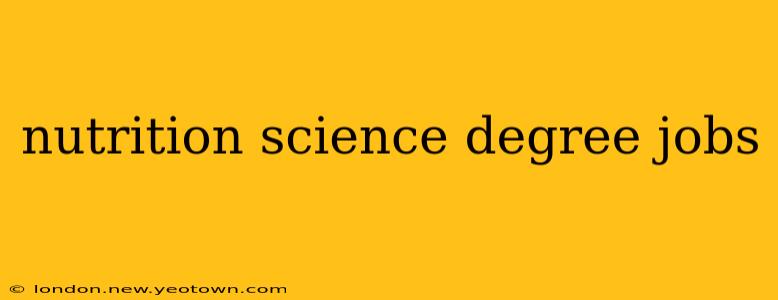The aroma of freshly baked bread, the vibrant hues of a farmers market, the satisfying crunch of a perfectly ripe apple – these are just a few sensory experiences that draw many to the fascinating field of nutrition science. But a passion for food and health is only the first step. Landing a fulfilling career after earning a nutrition science degree requires careful planning, networking, and a clear understanding of the diverse career paths available. This isn't just about counting calories; it's about understanding the complex interplay between food, health, and wellbeing. Let's explore the exciting possibilities that await graduates in this dynamic field.
What Can You Do With a Nutrition Science Degree?
The truth is, a nutrition science degree opens doors to a surprisingly broad range of careers. It's not a one-size-fits-all situation; the path you choose depends on your interests, further education, and personal goals. Some roles are directly related to dietary advice and client interaction, while others delve deeper into research and policy.
One common pathway is becoming a Registered Dietitian (RD) or Registered Dietitian Nutritionist (RDN). This requires completing an accredited dietetic internship after graduation, followed by passing a national exam. RDs and RDNs work in a variety of settings, from hospitals and clinics to private practice and corporate wellness programs. They provide personalized nutrition counseling, develop meal plans, and educate individuals and groups about healthy eating.
Another avenue is pursuing a career in nutrition research. This could involve working in universities, government agencies, or private research institutions. Researchers design and conduct studies to investigate the impact of diet on health outcomes, contributing significantly to our understanding of nutrition and disease prevention. This path often requires further education, like a Master's or PhD degree.
What Are the Different Job Titles in Nutrition Science?
The job market for nutrition science graduates is diverse and constantly evolving. While "Registered Dietitian" is a prominent title, many other roles exist, offering a spectrum of responsibilities and work environments. Let's explore a few:
-
Public Health Nutritionist: These professionals work to improve the health of populations by developing and implementing nutrition programs and policies. They often work for government agencies or non-profit organizations.
-
Community Nutritionist: Similar to public health nutritionists, but often with a more direct focus on community outreach and education.
-
Sports Nutritionist: These specialists work with athletes and active individuals to optimize their diets for performance and recovery. They help athletes understand the role of nutrition in training, competition, and overall health.
-
Food Scientist: While not strictly a "nutritionist" role, food scientists with a strong nutritional background can contribute significantly to the development of healthier food products. They work on improving the nutritional value of foods while maintaining taste and appeal.
What is the Job Outlook for Nutrition Science Graduates?
The job outlook for nutrition professionals is generally positive, driven by the growing awareness of the connection between diet and health. However, the level of competition can vary depending on the specific career path and geographic location. Areas with a high concentration of healthcare facilities or research institutions typically offer more opportunities.
Factors influencing the job market:
-
Aging population: The increasing number of older adults, with their greater need for healthcare services, creates increased demand for nutrition professionals.
-
Growing awareness of chronic diseases: The rise in chronic diseases like diabetes and heart disease fuels the need for professionals who can help prevent and manage these conditions through dietary interventions.
-
Focus on preventative healthcare: A shift towards preventative healthcare emphasizes the role of nutrition in maintaining health and well-being, boosting demand for nutrition professionals.
What Skills Do You Need for a Nutrition Science Job?
While technical knowledge is crucial, possessing a diverse range of skills will significantly enhance your career prospects:
-
Strong communication skills: Explaining complex nutritional concepts to diverse audiences is essential, whether it's counseling clients or presenting research findings.
-
Critical thinking and analytical skills: Analyzing data, evaluating research studies, and making informed decisions are vital for success in this field.
-
Problem-solving skills: Developing personalized nutrition plans requires creative problem-solving to address individual needs and preferences.
-
Interpersonal skills: Building rapport with clients and colleagues is essential for effective collaboration and client satisfaction.
What Kind of Salary Can I Expect?
Salaries for nutrition professionals vary depending on factors like experience, education level, location, and the type of employer. Entry-level positions may have lower salaries, while those with advanced degrees and significant experience can earn significantly more. Researching salary data for specific roles and geographic areas is crucial for realistic expectations.
How Can I Increase My Job Prospects?
Beyond a solid educational foundation, several strategies can enhance your career prospects:
-
Gain practical experience: Internships, volunteer work, or part-time jobs in relevant settings provide valuable experience and build your network.
-
Network strategically: Attending industry events, connecting with professionals on LinkedIn, and participating in professional organizations can open doors to opportunities.
-
Pursue further education: A Master's or PhD degree can significantly broaden your career options, especially in research or specialized areas.
-
Develop specialized skills: Focusing on areas like sports nutrition, pediatric nutrition, or culinary nutrition can make you a more competitive candidate.
The journey from earning a nutrition science degree to landing your dream job is filled with opportunities. By understanding the diverse career paths available, developing relevant skills, and actively pursuing your goals, you can embark on a rewarding career that contributes to the health and well-being of individuals and communities.

